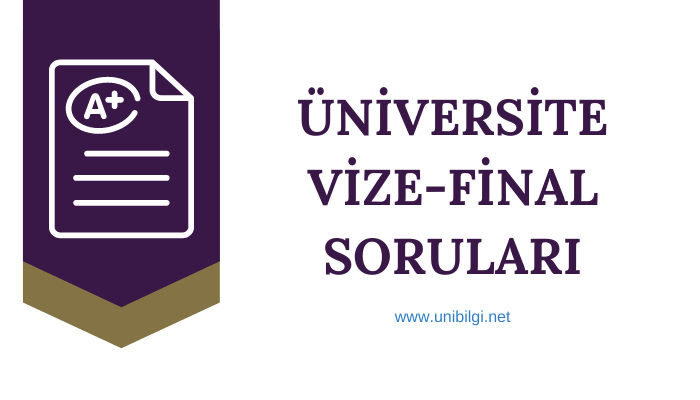Ege Üniversitesi İİBF Geçmiş Yıllarda Çıkmış Theory Soruları

Geçmiş yıllara ait theory soruları
1. Why and how, do you think, was early study of international relations influenced greatly by liberal ideas (or what we now call “idealism”)? Please also explain to what extent and how those ideas shaped the statecraft and practice of international relations.
Answer:International relations as an academic discipline was started in 1919 by Woodrow Wilson who was a political scietist.The main rason why we should international relations is the fact that entire population of the world is divided into seperate territories,political communities,namely independent states which profoundly affect the way people live.Debate between Realism and Idealism is important in terms of international relations.This discussion with the discipline of international relations has emerged.Revealed the main questions of international relations Idealism is.First theoritical approach.It’s about how to stop wars!The first dominant academic theory of international relations.Idealism was searching for answer:Why do the wars begin?How can we prevent wars?How can we achieve peace?These include liberal understanding ideas.U.S had a president whose name is Woodrow Wilson.He had a liberal thinking.In 1918 Wilson made a speech.He had a 14 pointed programme.It was Wilson’s peace programs.It includes that:There is no secret diplomacy.Armaments should be reduced.Freedom of navigations.(free trade)Colonial claims issues should be solved out.A general association of nations.”The League of Nations” was established in 1919.General two feature,promotion democracy is self determination.General associations was going to be functional.The creation of an international organizations.Unıversal moral principles rather than national interests in international affairs should be mindful of the defensive approach is utopian optimism.This approach is more on how states behave how they should behave that is on.it is a theory describing the basic domestic policy but foreign policy in international relations explains.
2. E. H. Carr’s book The Twenty Years’ Crisis presented an influential critique of “idealism” in the late 1930s. Please identify and discuss what fundamental critics he directed against idealist thinkers and their liberal internationalist ideas?
Answer:E.H.Carr says: ”Idealists are misunderstood of the structure of ınternatıonal relations.(Twenty years crisis 1939).Consider a Realistic Idealists E.H.Carr says go beyond the Idealism of utopia can only investigate what is happening and how it is realism.But international relations provides a more scientific to investigate.E.H.Carr realism that tkes the conventional.Through E.H.Carr we made a basic definition of Realism with the publication of ”Twenty years crisis” the debate between Idealists and Realists and ın debate 1940 new realists emerged in the discipline the most important word that systematically..The three core elements that we identify with Realism ,statism,survival,self-help are present in the work of a classical realist.We argue that these ”three s” constitute the corners of the realist triangle.The human nature is self-interest,bad,power seeking and aggressive.The nature of international relations are international anarchy.The wiev of history is continuity and repetition.E.H.Carr to critics about Idealism,he argue that realists.He argue that its realists three principles.Theory create practice.Are just reflection what is going an international politics.Power create ethics.İnterests on common social.E.H.Carr didn’t can believe that principle.Cooperation should be based on liberal theory must be peace.As against this, the power Realism important.
3. What, do you think, is the significance of the so-called “behavioural revolution” in IR for the study world politics? Please discuss with special reference to its fundamental aspiration, basic propositions, and claims about studying international phenomena while putting its critics of existing perspectives in IR at the time it emerged. After the second world war, the academic discipline of IR exponded rapidly.Especially,in the US, the government supported ”scientific” IR research.This support produced a new generation of IR scholars who adopted a very different methodological approach.They were trained in political science,economics,mathematics and the natural sciences.They had a very different academic background and different ideas.These new ideas come to be called under the term of behaviouralism,which is a new methodology but not a new theory.The main task is to collect pirical data about international relations,which can be used for measurement,classification,generalisation and the validation of hypothesis,such as scientifically explained patterns of political behaviour of the states.Behaviouralism is interested in observable facts and measurable data in order to find the reoccuring behaviouaral patterns,and to create the ”laws” of international relations.According to behaviouralists ,facts separate from values.Unlike facts,values can not be explained scientifically. Some of the most important IR quesions are methodological in nature.Such issues became prominent with the ‘behavioural revolution’ in the 1950s and 1960s.Since the end of the cold war,methodological issues have returned to centre-stage in a debate between positivist and post-positivist methodologies.The scientific approach to international relations would provide a ver suitable subject for the sort of criticism that Bernard crick has applied to a wider target in his admirable book The American Science of Politics criticism that would,by describing its history and social conditions,isolate the slender and parochial substrusture of moral and political assumption that underlies the enterprise.
4. Bearing in mind Hedley Bull’s views articulated in his article “International Theory: The Case for a Classical Approach,” in what ways did the traditionalist students of IR respond to the behaviouralist project and claims, and how did they criticize behaviouralist mode of approach to studying and explaining international phenomena.
The first of these I shall call the classical approach.By this I do not mean the study and criticism of the ”classics” of international relations,the writtings of Hobbes,Grotius,Kant and other great thinkers of the past who have turned their attention to international affairs.The scientific approach to the theory of international relations, so defined ,is present in the theory of international systems.In setting out to provide such a rational criticism one may begin by dismissing a number of complaints commonly directed at the scientific approach which are beside the point.Another unsatisfactory line of criticism is that which focuses not upon the doctrine of the scientific theorists but upon the motives that have driven them to propound it.I should ned to be surer than I am that my own motivs in preparing this paper are wholly disinterested before inviting criticism of them by attacking those of others.Finally,it is a mistake to see in the scientific approach,or in any one of the methods that go to make it up,the instrument of any particular political purpose in foreign or defense policy.Having stated the case against the scientific approach I must return to the qualifications I introduced at the outset.



